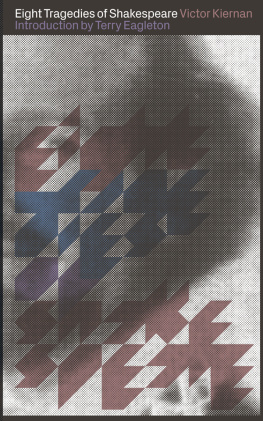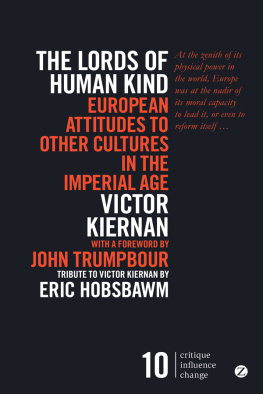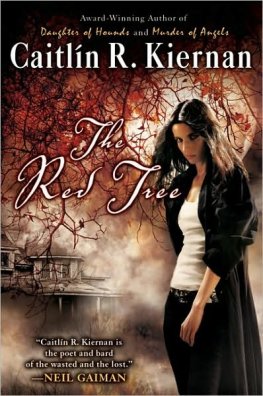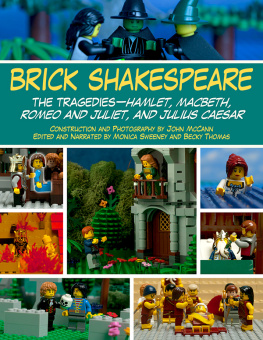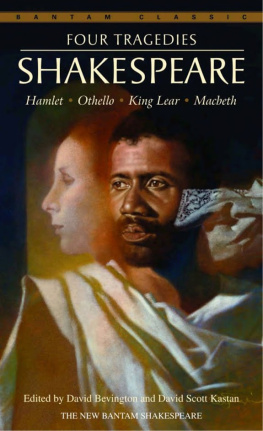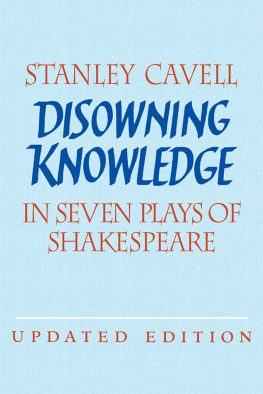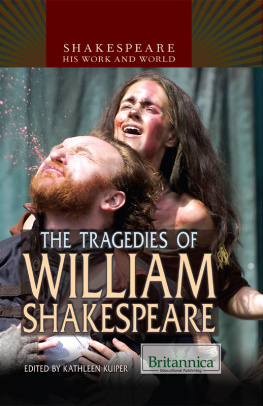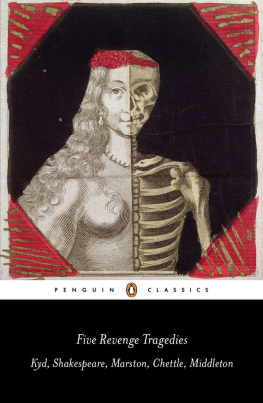
About Victor Kiernan
Victor Kiernan (19132009) ranks among Britains most distinguished historians. After a fellowship at Trinity College, Cambridge, and a long period spent teaching in India, he joined the History Department at the University of Edinburgh, where he served as professor of modern history from 1970 until his retirement. Over the course of his life he authored such works as Eight Tragedies of Shakespeare, The Lords of Human Kind, European Empires from Conquest to Collapse, The Duel in European History and numerous others, as well as translating two volumes of Urdu poetry.
Other works by Victor Kiernan available from Zed Books
Shakespeare: Poet and Citizen
The Lords of Human Kind: European Attitudes
to Other Cultures in the Imperial Age
America: From White Settlement to Global Hegemony
EIGHT
TRAGEDIES OF
SHAKESPEARE
VICTOR KIERNAN
Introduction by Terry Eagleton

Eight Tragedies of Shakespeare was first published in 2016 by Zed Books Ltd, The Foundry, 17 Oval Way, London SE11 5RR, UK
This ebook edition was first published in 1996
www.zedbooks.co.uk
Copyright Heather Kiernan, 1996 Introduction Terry Eagleton, 2016
The right of Victor Kiernan to be identified as the author of this work have been asserted by him in accordance with the Copyright, Designs and Patents Act, 1988
Cover designed by Michael Oswell.
All rights reserved. No part of this publication may be reproduced, stored in a retrieval system or transmitted in any form or by any means, electronic, mechanical, photocopying or otherwise, without the prior permission of Zed Books Ltd.
A catalogue record for this book is available from the British Library
ISBN 978-1-78360-735-8 hb
ISBN 978-1-78360-688-7 pb
ISBN 978-1-78360-689-4 pdf
ISBN 978-1-78360-690-0 epub
ISBN 978-1-78360-691-7 mobi
To
N.S.K.
Bear free and patient thoughts.
King Lear IV.vi.80
Contents
Women and Men
Introduction
by Terry Eagleton
Marxist criticism of Shakespeare begins with Marx himself, who as a formidably erudite scholar in the great heritage of European humanism had a passion for his work and quotes liberally from it in his own writings. His comments, however, tend to be as brief as they are perceptive; whereas what this absorbing study has to offer is a set of detailed, sustained analyses of the major tragedies, all set firmly in their historical context and properly unafraid to raise that most embarrassing and impolite of all English subjects, the question of social class.
Kiernan begins by noting the complex relations between the extraordinary flourishing of tragedy in Elizabethan and Jacobean England and the fact that it took place in an era of profound historical transformation. One might add to his remarks that this relation is not confined to that particular moment. There have been four major outbreaks of tragic art in the history of Europe ancient Greece, the age of Shakespeare, the moment of French neo-classical tragedy and the modern period from Ibsen to Arthur Miller and all of them occur at a time of momentous transition. More particularly, tragedy tends to emerge at a point where a traditional order is still up and running but is increasingly in conflict with forces which threaten to undo it. The ancien regime is on the wane but still powerfully influential, while the emergent world is increasingly buoyant but unable as yet to oust it.
It is not hard, for example, to see ancient Greek tragedy as staging just such a collision between the realm of myth, gods and heroes, and the gradual dawning of a new form of enlightened rationality which subjects that sacred sphere to critical interrogation. Oedipus is a key figure here, as a character who must deploy his rational powers to discover the fearful secret of his origin, but who in doing so becomes tragically aware of just how much eludes the conscious mind and shades off into darkness. As for French neo-classical drama, Lucien Goldmann has brilliantly demonstrated in The Hidden God how the silence of God in an increasingly secular, rationalised world does not render the intolerable burden of his presence any less painful.
Modernism, it has been claimed, arises from a process of modernisation which is still incomplete. It is when the modern is still alarmingly or exhilaratingly new that it tends to produce such audacious cultural experiment, which is doubtless one reason why Britain, as the oldest industrial capitalist society in the world, had to import most of its own modernists (Wilde, Shaw, Conrad, James, Eliot, Pound, Yeats, Joyce, Beckett) when that movement broke dramatically over Europe and the United States. As a transitional affair, modernism finds itself caught between the old order and the new; and nowhere is this more evident than in the drama of its greatest tragedian, Henrik Ibsen, in which in the very moment of reaching out for an emancipated future, the past tends to tumble down and bury you like an avalanche. The typical Ibsenite protagonist finds himself or herself trapped in an intolerably tight spot, unable to move either backwards or forwards, consumed by the lethal legacies of the past in the very act of seeking enlightenment.
In the case of Shakespeare, as Kiernan convincingly shows, we are speaking of the gradual emergence of certain new historical forces connected with the growth of the bourgeoisie forces which involve not only social and political upheaval, but a veritable revolution in the way that men and women conceive of themselves and their surroundings. The keynote is struck by a colleague of Coriolanus, for whom this hero behaves As if a man were author of himself, And knew no other kin. This ideology of self-ownership or self-entrepreneurship is profoundly alien to a more traditional doctrine of human nature, one which it is not hard to see Shakespeare himself as endorsing, for which the self is constituted not by its own autonomous, self-determining powers but by its kinship, social functions and political loyalties as well as by its place in a divine and natural order. The problem is that if the so-called New Men tend to be predatory and destructive, they are also for the most part thrillingly active, resourceful and alive; and if the tragic conflicts in Shakespeare are as compelling as they are, it is not least because the plays give these emergent forces their full due, exercising all of their imaginative sympathies to dramatise them from the inside.
Marxist criticism, Fredric Jameson once remarked, has an obligation to come to terms with the shape of the sentences. Otherwise it remains a form of content analysis only. If one has a rebuke to level at this illuminating work, it is that it does not give artistic form the sustained attention it demands, or acknowledge how form is just as much a bearer of ideological meaning as content. Even so, it is wonderfully refreshing to read an account of Shakespeare which stresses the less-than-palatable historical factors which most Shakespearian criticism tends to pass over in polite silence. This greatest poem of our greatest writer, Kiernan observes of King Lear , is set in a land of poverty, oppression, misrule, the grinding defects of a whole social machine. It is, in a sense, a simple enough point to make. Yet one would have to search very far to find another commentator on the plays so alert to the material conditions from which they emerge, and so unfashionably prepared to pass political judgments on them out of an abiding concern for justice.
Next page
